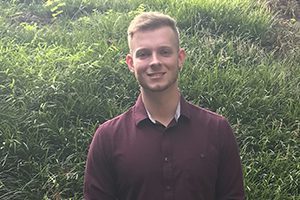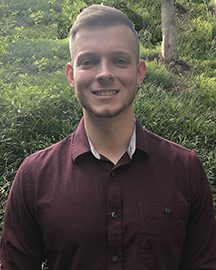Thomas D. Walsh Graduate Research Fellowship 2018-2019 Congratulates Matthew Freeman!

Please join us for the Thomas D. Walsh Graduate Research Fellowship Reception on Friday October 12 from 3 pm- 5 pm in recognition of our twelfth recipient, Matthew Freeman.
RSVP no later than Friday, October 5 to Tammi Smith: tsmit360@uncc.edu
The Thomas D. Walsh Graduate Research Fellowship, made possible by the generous support of Dr. Thomas D. Walsh (link to web page), recognizes outstanding contributions by M.S. candidates to graduate research. Returning graduate students are eligible for this prestigious award after their first year. The Thomas D. Walsh Graduate Research Fellowship supports the winner with a research assistantship and tuition support through their second year.
During the last application cycle the Master’s Program Committee decided on two finalists: Matthew Freeman and Tim Wallen. Both finalists gave a research presentation to a judging panel and discussed their projects with the jurors. The panel ultimately awarded the Thomas D. Walsh Graduate Research Fellowship for the academic year 2018-2019 to Matthew Freeman, whose short biography and research synopsis is given below. Matt will give a public presentation at the Annual Thomas D. Walsh Graduate Research Fellowship Presentation on Friday, October 12, 2018. Further details about the location and schedule will be posted soon.

Matthew Freeman is originally from the Charlotte, NC area and received his B.S. in Chemistry at the University of North Carolina at Charlotte in 2018. As an undergraduate student, he joined the research laboratory of Dr. Bejger (link to web page) in 2015 as the first undergraduate group member. Matt was a Charlotte Research Scholar during the summer of 2016. His research has focused on the design and synthesis of molecules and molecular clusters for use as electrolytes in aqueous redox flow batteries. Specifically, he has prepared the first water-soluble cobalt sulfide cluster that has been structurally and electrochemically characterized. He plans to continue investigating metal sulfide clusters as soluble charge storage species during his Masters research. Matt plans to pursue a career in energy storage, preferably researching battery materials at one of the national laboratories.
Redox flow batteries (RFBs) are an emerging technology for grid and microgrid scale energy storage. Large-scale implementation of RFBs, however, is hindered by the cost of the active species, which typically consists of dissolved vanadium salts. The Bejger lab is currently studying metal sulfide clusters as inexpensive alternatives for vanadium-based electrolytes. These clusters play a major role in several biological redox processes, exhibiting high efficiency and electrochemical reversibility. Additionally, synthetic metal sulfide clusters can be prepared from a large variety of metals and are known to exist in numerous geometries. Phosphine ligands, which stabilize the cluster-core, can be modified to tailor the solubility, geometry, and electronic properties. Matt’s thesis goal is to produce inexpensive, efficient, and non-toxic electrolytes using clusters comprising iron and sulfur.